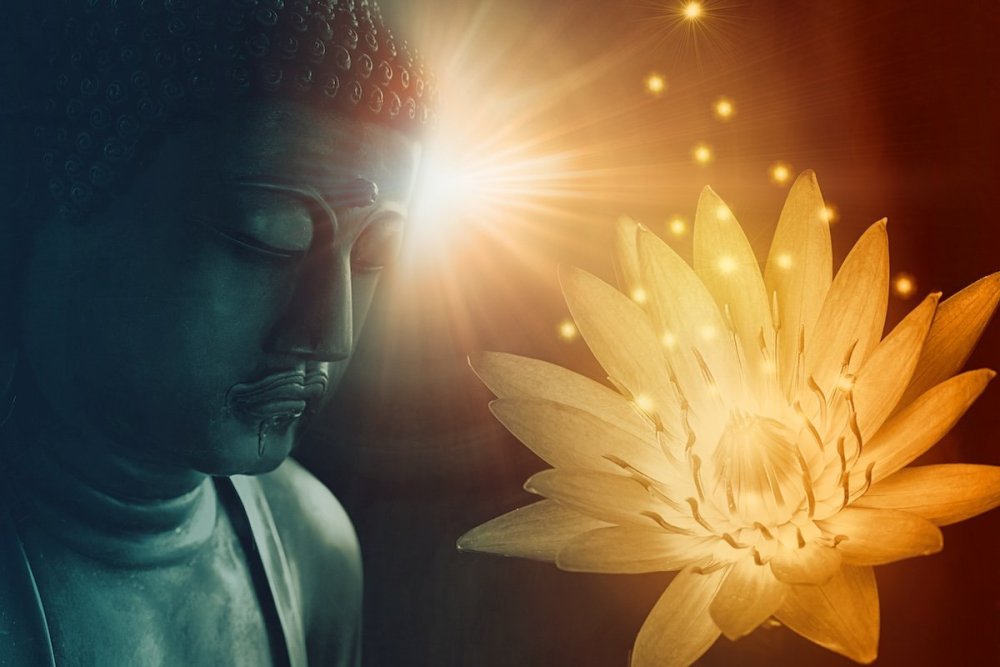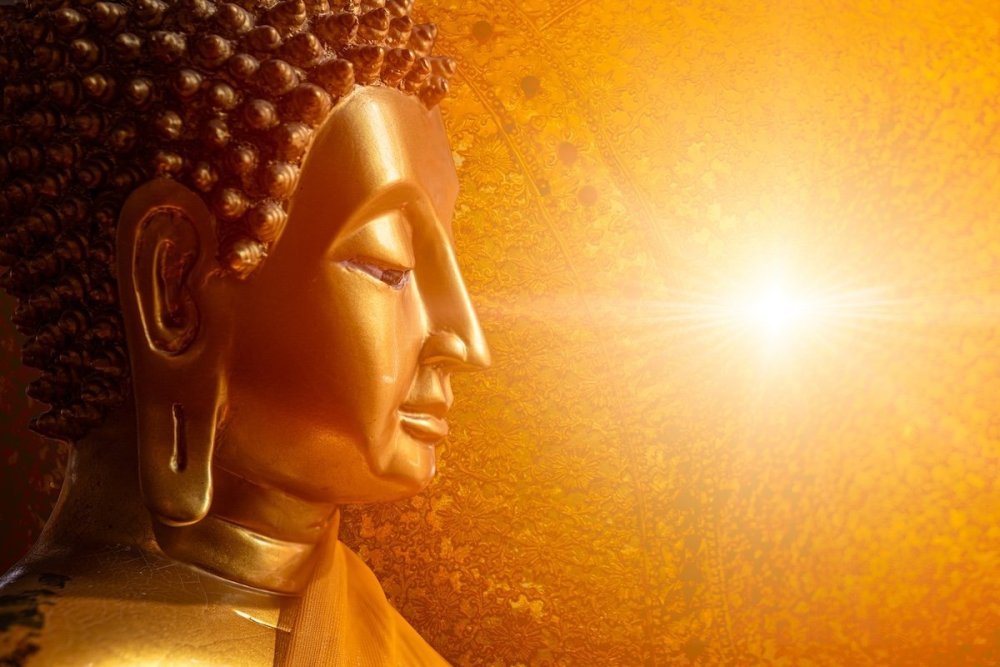Ann Vrlak explores the concepts of awakening and the path to becoming enlightened – seeing things as they truly are and free of suffering. So, what is enlightenment in Buddhism and is it possible to achieve it?
Buddhists use the word “enlightenment” to refer to the goal of their philosophy and practice. But what is enlightenment? And is it something people still believe is possible to achieve today?
Enlightenment has a definite meaning. For Buddhists, it describes a state of freedom different from the unhappiness that many people experience – that all of us experience to some degree, the Buddhists would say!
Let's dive into this question and the Buddhist perspective on how to achieve enlightenment. And we’ll take a brief look at how and why the Buddha’s own path continues to inspire followers today.
What Is Enlightenment In Buddhism?
The common impression of enlightenment is a kind of rare religious state that very few people can attain or even imagine. But, the root of the word enlightenment is “bodhi”, which means to “awaken, notice or see clearly.”
Enlightenment in Buddhism literally means a state where you see all of reality as it is – ourselves, other people, and the world around us.
Opening up to enlightenment in Buddhism
As you might guess, this means Buddhism is based on the belief that we do NOT usually see things clearly. Our own past experience and beliefs, says the Buddha, create filters that make it difficult for us to see things as they actually are.
It All Began with the Buddha
The Buddha based his teachings on his own life as an Indian prince. Everything he thought he knew radically changed when he saw life outside his privileged home. He saw sickness, old age and death – all things his family had protected him from.
He became committed to understanding the dilemma of human suffering. After a few years of wandering and seeking, he vowed to sit in one spot until he gained that understanding. He wanted to experience enlightenment first hand.
“Enlightenment in Buddhism literally means a state where you see all of reality as it is – ourselves, other people, and the world around us.”
For 40 days, he sat under a tree, facing every possible difficulty and temptation. In Buddhist texts, Mara the symbol of illusion, threw all her weapons at him, from doubt, to desire, to fear. Can you imagine what he might have felt and thought, sitting alone for 40 days?
In the Buddhist descriptions of his enlightenment, Mara’s weapons became flowers when they touched him.
He became the Buddha – the “awakened one.” And he created a clear path for others to follow, regardless of their culture or social status.
Is Awakening the Same as Enlightenment?
Sometimes the words “awakening” and “enlightenment” are used interchangeably. It’s true they both refer to this kind of seeing through illusion to the reality of life, with one important difference.
Awakening is a temporary glimpse. Enlightenment is a lasting transformation.
Anyone, whether or not they consider themselves Buddhist, can have an awakening. This experience can develop after working through a spiritual practice or it can be spontaneous. 
How to achieve enlightenment? Self-examination and pratice
One day, you see the ocean drive you take every morning as the most moving, beautiful thing. Or, in a familiar disagreement with your partner, their point of view is suddenly obvious and you see a new way to connect.
Enlightenment is also seen as escape from the cycle of death and rebirth that Buddhists believe people pass through, until they are free of suffering. When you become enlightened, you are free in your lifetime. Individual enlightenment is seen as the ultimate attainment in Theravada Buddhism, one of the main branches of Buddhism.
What is Enlightenment Like?
You have probably heard the term nirvana. It has a rich meaning used to describe the state of enlightenment. It refers to an absence of some things and a presence of others.
What Enlightenment Isn’t
Nirvana or enlightenment is a state without suffering and without concepts. It means living day to day without anxiety, sadness, fear, greed or jealousy. It does not mean those feelings would never come up for you, but you don’t become stuck in them or even believe them. You understand that they come and go – they are impermanent.
RELATED:
Enlightenment also doesn’t mean being indifferent to the suffering of others. Nirvana is a state of deep compassion and the desire to help everyone on the path.
What Enlightenment Is
The word nirvana means “to blow out,” like you would blow out a candle. Nirvana puts out the flame of suffering, so the peace of life shines through.
“Enlightenment is seen as escape from the cycle of death and rebirth that Buddhists believe people pass through, until they are free of suffering. When you become enlightened, you are free in your lifetime.”
The foundation of nirvana is a still, spacious mind that allows everything you experience to flow through. A person who is enlightened feels a sense of kinship with all beings, recognizing the same “reality” we all share.
How to Achieve Enlightenment
Buddha believed that enlightenment in this life, not an afterlife, was a real possibility for everyone who was willing to examine themselves and follow his teachings.
In Buddhism, succeeding on the path depends on three core practices:
-
Ethical conduct If our philosophical or spiritual beliefs are not mirrored in our actions, they lack power. Buddhism offers clear guidelines to live with honesty, kindness and an attitude of non-harming toward all things.
-
Wisdom and insight This is both a goal of the path and something we can practice along the way. Wisdom comes through seeing the impermanence at the centre of experience – thoughts, feelings and situations all come and go.
- Meditation Buddhism regards meditation as the ultimate mind training. Because our minds are so distractible, meditation is the way to develop the stable mind needed to see reality clearly, without fear or distortion.
Takeaway: What is Enlightenment in Buddhism?
The ideas of suffering and enlightenment are not in any way about blame. In fact, they are deeply grounded in compassion. They say, “This is the way all of us live sometimes! There’s nothing wrong with you, but there is a way to be at peace.”
Still, is enlightenment relevant to modern life?
You might reflect on questions like these to answer this question:
-
If you exchange the word “suffering” for loneliness, worry, guilt, anxiety or sadness, do you think you “suffer”?
-
Do you think your words, actions and belief can influence how you experience your life – for better or for worse?
- Have you had moments when you suddenly stepped outside your usual way of seeing or being, and saw things in a totally new way?
Enlightenment may seem like an impossible idea or goal. However, even brief moments of awakening can transform your mind. When that happens, the journey towards enlightenment itself becomes an awakening. •
Images: shutterstock/Quality Stock Arts, shutterstock/KieferPix
happiness.com | The fine art of being: learn, practise, share
Are you a happiness.com member? Sign up for free now to:
■ enjoy our happiness magazine with practical life tips
■ share and support others in our happiness forum
Acceptance | Altruism | Gratitude
Written by Ann Vrlak
 Ann Vrlak is Founder of OneSelf Meditation and a meditation practitioner for over 25 years. She’s a Certified Meditation Teacher for adults and for children (the best job ever!). She loves to share how the perspective and practice of meditation can support people with their everyday stresses and on their journey of self-discovery.
Ann Vrlak is Founder of OneSelf Meditation and a meditation practitioner for over 25 years. She’s a Certified Meditation Teacher for adults and for children (the best job ever!). She loves to share how the perspective and practice of meditation can support people with their everyday stresses and on their journey of self-discovery.



Join the conversation
You are posting as a guest. If you have an account, sign in now to post with your account.
There are no comments to display.